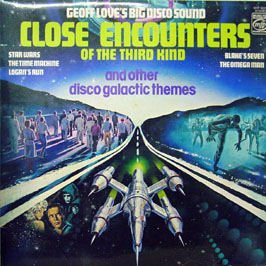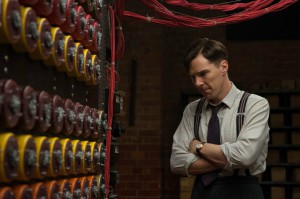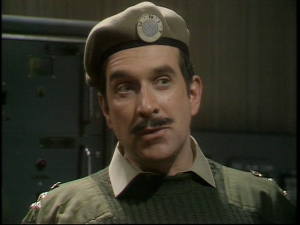 A recent Facebook discussion made me all nostalgic for a classic of my childhood, Geoff Love’s Star Wars and Other Space Themes. I wondered if it was available on Amazon and, blow me down …
A recent Facebook discussion made me all nostalgic for a classic of my childhood, Geoff Love’s Star Wars and Other Space Themes. I wondered if it was available on Amazon and, blow me down …
It’s probably rare for a cheesy easy listening covers album to hold a special place in one’s heart, but it does for me, and I can think of at least two friends in the sf community who have admitted similar feelings. Why? Well, because I learned a lot from this album.
No prizes for guessing that my sole reason for buying it, at the age of 13, in 1978, was to get hold of the Star Wars theme. As far as I was concerned this LP was a single with an A side and a lot of B sides. I had seen the movie once by this stage, and remembered the music as being quite good. For some reason I had it in my head that it was a bit like the theme to Born Free. (At least, it goes up and down in an approximately similar way.)
And I learned …
I began to learn new things just from the cover, which featured a montage of people and ships that were obviously based on the shows depicted on the album … but weren’t. That wasn’t Luke and Leia. (‘Luke’ is more like a bizarre Luke/Han hybrid.) That ship might be based on a Federation design but it’s not the Enterprise. There’s a space station which may or may not be the one from 2001, except that it seems to have part of a third ring which somehow gets lost.
And there was a fairly straightforward rendition of Jane Fonda as Barbarella, which no 13 year old boy was ever going to complain about.
So, I learned that artists can have fun riffing off other artist’s work. I’m sure all the rights were paid – no one was getting ripped off – but why confirm mindlessly to what is when you have your own idea of what could be?
I also learned a few things from the track list, like the very existence of Things to Come, the aforesaid Barbarella, and Quatermass. I decided I would seek these things out and find out more, and am glad I did.
And then there was the music, which brings me back to the first point – artists having fun by being inspired. The title track is a straight orchestral rendition of the Star Wars theme, and as that was what I bought it for, I can’t really complain. Other straight orchestral pieces are Holst’s “Mars, the Bringer of War”, a thankfully abridged version of “Also Sprach Zarathustra” and the theme to Things to Come. But the rest … Different versions of Star Trek and Thunderbirds and U.F.O. and Space: 1999 and … and … With everything from orchestra to sax to 1970s wacka-wacka electric guitar, sometimes in the same track (and something else I didn’t know and could not have appreciated at the time: the legendary Herbie Flowers on bass. I didn’t know that bass existed, though could probably have worked out that something must be making those deep notes).
And, what the hell was Princess Leia’s theme, I wondered? I only knew the title music: I didn’t recognise any others. But the next time I watched Star Wars, now that I knew of its existence, I was able to pick it out of the background music. Since then I’ve learned to listen to what is going on as well as watch it, and that has helped me enjoy movies on a different level to simple childlike reception.
And an extremely boppy version of Doctor Who, which at first irritated the hell out of me because I accepted no substitutes. But, you know, it grew on me … And I had no idea there would come a time when I would look back on it and wish we could have that one instead of the Bontempi drek that assaulted us during the 80s. Again, artists having fun, coming up with new ideas, fresh expressions, and why not?
Don’t take my word for it.
Soon after this Geoff Love bandwagoned his way onto the other big craze of the late 70s, with Close Encounters of the Third Kind and Other Disco Galactic Themes. This has been tacked onto the end of the first album in the Amazon download, so if you buy the first one you get this free. This one is … differently good.
 No longer Geoff Love and his orchestra, note: we’re onto Geoff Love and His Big Disco Sound. Disco-tastic versions of the CE3K theme (which I will grudgingly admit actually improved on the original tune by having one) and other sf classics such as, um, Logan’s Run, The Omega Man and Flight Fantastic, whatever the hell that was last one is. Apart from the title track, the only one worth the admission price is the discoed version of Blake’s 7, which at least justifies the inclusion of a four-armed Liberator-alike on the cover. But you do rather get the idea they were running out of ideas.
No longer Geoff Love and his orchestra, note: we’re onto Geoff Love and His Big Disco Sound. Disco-tastic versions of the CE3K theme (which I will grudgingly admit actually improved on the original tune by having one) and other sf classics such as, um, Logan’s Run, The Omega Man and Flight Fantastic, whatever the hell that was last one is. Apart from the title track, the only one worth the admission price is the discoed version of Blake’s 7, which at least justifies the inclusion of a four-armed Liberator-alike on the cover. But you do rather get the idea they were running out of ideas.
And so my last lesson, which I really wish Geoff had learned too, was: quit while you’re ahead.
Because I can, I will leave you with the Geoff Love rendition of Blake’s 7.


